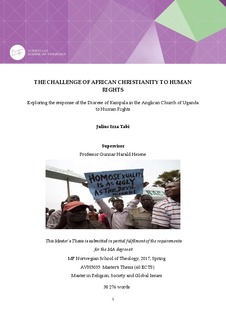The challenge of African Christianity to human rights: exploring the response of the Diocese of Kampala in the Anglican Church of Uganda to Human Rights
Abstract
The Human rights doctrine is one of the fast-growing concepts of the 20th century that has become embedded in democracy, legal systems and is key in driving the value system in many communities today. Proclaimed as the UDHR in 1948 by the UN General Assembly and simplified in specific rights in various international covenants, human rights have largely appealed to all people across political, cultural and religious divide. Despite its wide acceptance, the human rights doctrine is not fully welcomed in some cases hence being challenged by some cultures, regions and religions. This research has sought to study how the response of the Diocese of Kampala (Anglican) to Human Rights challenges the human rights project.
This social research employed a qualitative interview method of data collection and an inductive approach of data interpretation. The research has shown that there is an ambivalence to the human rights doctrine in the Diocese of Kampala based on cultural and religious accounts. That the African Christians in the Diocese are discontent with some of the clauses in the human rights doctrine that are regarded to have no place in their cultural and religious values. Such human rights in question includes; the right to abortion, homosexual practice and or the LGBTI rights, restraining coercive discipline of children, early sex education among others. A strong value is placed on cultural and religious values than to human rights.
In this study, the researcher concludes that the worldview of an African Christian is fully informed by her cultural and religious convictions. Hence for a concept like human rights to take ground, it must not put religion in a cage. Rather religious values should be cherished and religions should be engaged in both the construction and implementation of human rights.
